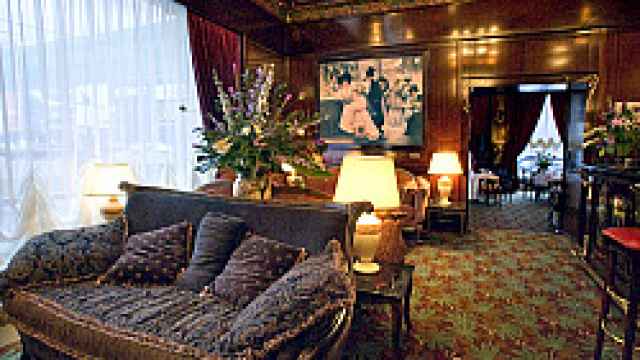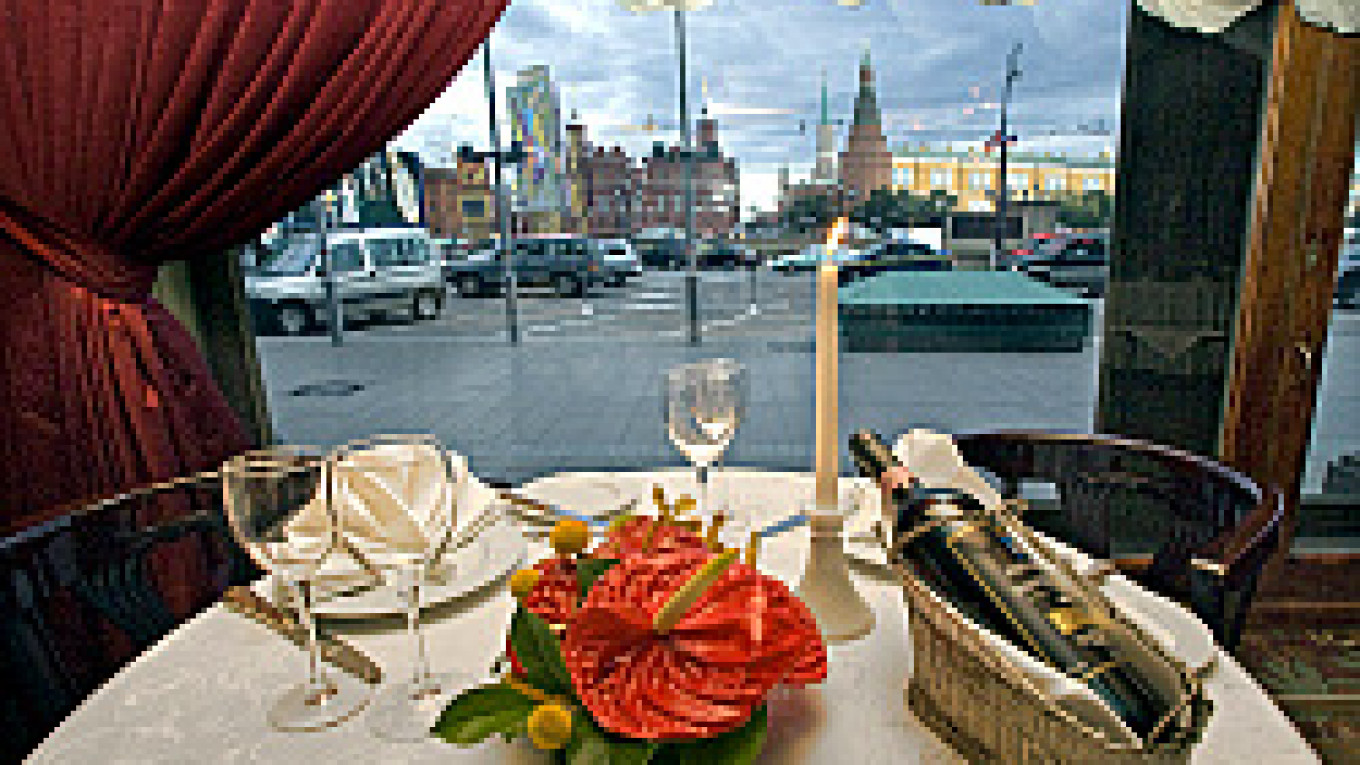Long ridiculed for their blatant displays of wealth, New Russians are taking a lesson from their old-money Western counterparts and learning to leave some things to the imagination.
In Moscow, the VIP National Club and Club Monolith are working to create exclusive communities where privacy is the prized commodity and luxury can be taken for granted.
The dining room windows of VIP National Club offer such a spectacular view of the Kremlin that it is almost kitschy. A cloudless blue sky and the red fortress looming over a bustling Manezh Square: This is the way one is meant to see Moscow. The space itself, however, is more reminiscent of an English gentleman's club, unlike anything one would expect to find in a guide to Moscow.
"We want to provide an atmosphere of classical comfort," said Alexandra Khlestunova, the club's press manager. "This club has replaced Maxim's restaurant, but we have preserved the design of Pierre Cardin. Sometimes we think about becoming more modern, but we would not like to disturb the original."
Khlestunova took pains to assure the quality and authenticity of all elements of the club's decor. "The flower arrangements in the dining room are always fresh, all of our chandeliers are Swarovski, and the wallpaper in the cigar room is made of lambskin and embroidered with gold leaf."
She knocked on a marble pillar to illustrate that, unlike their competitors, VIP National does not settle for cheap imitations.
While the club does not charge membership fees, it welcomes only those who have attained a certain level of wealth and social standing.
"Status is the most important thing," Khlestunova said. "And of course, one must be dressed properly to come here."
 Vladimir Filonov / MT VIP National Club seeks to be true to its name, welcoming only those who have attained a certain level of wealth and status. | |
VIP National prides itself on importing practices of British hospitality standards in order to attract foreign stars and dignitaries. (The managing director, a former military man, admitted that he himself hadn't traveled farther than the Czech Republic.)
"Sophia Loren always calls us before she comes to Moscow. And look there," Khlestunova whispered, "that is Tom Jones eating lunch." She looked slightly embarrassed for having momentarily compromised the privacy of one of her guests by putting him on display.
While VIP National Club claims to have no competition in Moscow, the private Monolith Family City Club is another place where the elite can gather in a more informal setting.
The club, in its ever-increasing desire for privacy, refused to open its doors to The Moscow Times. Its 2007 "Members' News Magazine," however, reveals some of the benefits of joining the club.
Monolith's executive chef, Christopher Crot, who has worked in Paris, New York, and Singapore, is one of the club's main attractions. The club also boasts of its family-friendly atmosphere, fitness facilities that include a swimming pool, a private beauty salon, cooking classes, and a playroom for children.
Monolith, too, seeks to live up to a Western standard of luxury. Since opening its doors in 1996, the club has become a member of the International Associate Club organization. The club refused to disclose current fees or the identities of its members, but previously published articles about Monolith have suggested that Mayor Yury Luzhkov frequented the club. In 1999, The Moscow Times Business Review reported that in order to attract foreigners and create a cosmopolitan business milieu, the club asked its expatriate members for only a fraction of the membership fees paid by their Russian counterparts. Russian members then paid a joining fee of $14,000 and an additional $850 a year in dues, the magazine reported, while an expatriate member paid $4,500 to join and $1,000 in annual dues.
The cost of privacy must be factored into the fees: The members pay to be left to themselves. The crest and seal of the club adorn a brick structure that is otherwise indistinguishable from the neighboring apartment buildings. But as one neighbor put it, "We never know what goes on in there. They come, we see their cars in this yard, but they have nothing to do with us. Sometimes they open up that patio and we can see that they feed them pretty well over there."
While these two clubs are still bastions of luxury in Moscow, soon their attributes may be dwarfed by the billionaire playground that Aras Agalarov, owner and CEO of Crocus International, plans to build just north of the city.
Aras Agalarov has graced Forbes' list of the 100 richest Russians for years. Most recently, his net worth was estimated to be $360 million, but in 2004 Forbes awarded him the additional superlative of "the vainest of the Golden Hundred." Agalarov Estates, on 420 hectares of land in the Istra district of the Moscow region, is to encompass a community of 250 houses in a self-sustaining luxury environment: a golf course and club house, an artificial lake with a beach of imported white sand, a sports club, a hotel for the residents' guests, and even an exclusive private school.
Stephen Alexander, the project manager of the estate's golf course, said this community was "Mr. Agalarov's social experiment" aimed at creating a distinct class of the super elite. "I don't want to say he micromanages, but Mr. Agalarov is certainly involved in each minute aspect of the building project," he added.
Alexander said none of the houses on the estate would cost less than $30 million and that each potential buyer must have a personal interview with Agalarov. Despite the seemingly impossible cost of such luxury, Agalarov appears to have no trouble finding buyers. The first family to purchase one of the homes is to arrive on the property in September.
Asked what the neighbors thought of the development and the repercussions of drastically altering the environment, Alexander surveyed the landscape and said, "What neighbors?"
There are no neighbors in sight; the Agalarov property stretches out in all directions. There is a thin line of trees ringing the Estates but this barrier is hardly necessary. This self-contained suburban community for the super elite appears to be entirely secluded.
The future owners of these homes, just as the members of the VIP National and Monolith, are not your old-fashioned New Russians. They won't show themselves; they'll only let you imagine.
Contacts
Agalarov Estates, Voronino village, Zakharovo, Istra district, Moscow Region, 727-2424, info@crocus-city.ru
Monolith Family City Club, 39 Bolshaya Gruzinskaya Ul., 775-1488, monolith@aha.ru
VIP National Club and Casino, 15/1 Mokhovaya Ul., 797- 6000, infovipclub@vipcasion.ru
A Message from The Moscow Times:
Dear readers,
We are facing unprecedented challenges. Russia's Prosecutor General's Office has designated The Moscow Times as an "undesirable" organization, criminalizing our work and putting our staff at risk of prosecution. This follows our earlier unjust labeling as a "foreign agent."
These actions are direct attempts to silence independent journalism in Russia. The authorities claim our work "discredits the decisions of the Russian leadership." We see things differently: we strive to provide accurate, unbiased reporting on Russia.
We, the journalists of The Moscow Times, refuse to be silenced. But to continue our work, we need your help.
Your support, no matter how small, makes a world of difference. If you can, please support us monthly starting from just $2. It's quick to set up, and every contribution makes a significant impact.
By supporting The Moscow Times, you're defending open, independent journalism in the face of repression. Thank you for standing with us.
Remind me later.


